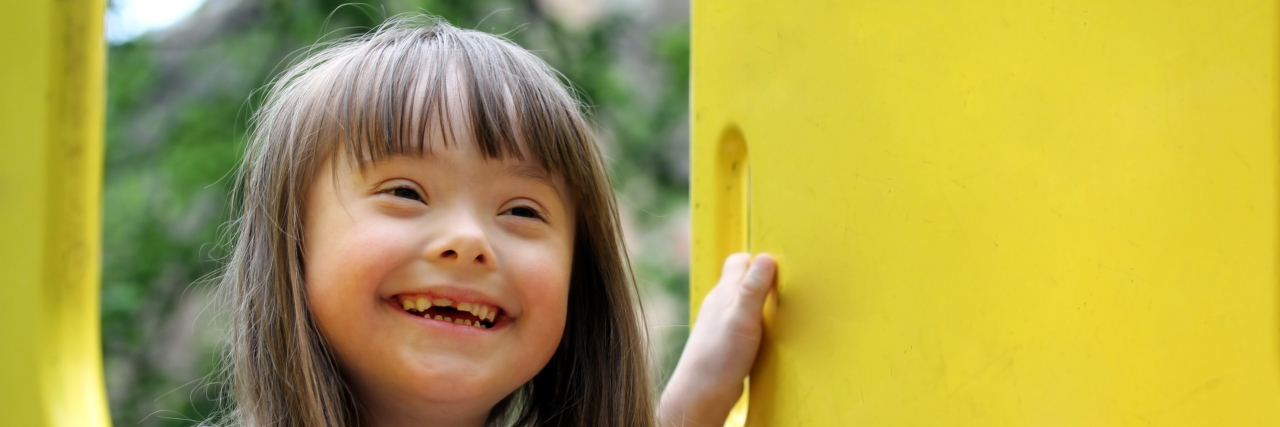Should You Say 'Special Needs' or 'Disability'?
Editor's Note
As part of our editorial guidelines, The Mighty does not use “special needs” to refer to children or adults with disabilities. While the term may appear in stories published before 2018, all articles submitted to our site today are edited prior to publication to ensure the use of respectful language. You can learn more about this policy here.
“Disabled” is not a bad word, and the disability community has expressed that euphemisms are unnecessary and harmful. We’ve updated our vocabulary, and after reading this article, we hope you will, too.
When I was a student in school, students with disabilities were placed in a separate class, they traveled together around the school building, and everyone knew who “they” were. Terms such as “retarded,” “stupid,” or “handicapped” were used so often. As I type these highly derogatory terms, my skin crawls. Over the years, our terminology has changed and become more respectful and mindful of the connotations of the terms we use. We want to make sure that how we refer to our children and other people’s children in a way that is loving, respectful and demonstrates the awareness of our child’s strengths without being offensive or avoidant altogether.
As a school and clinical psychologist, as well as a parent of children with disabilities, I have worked with children with all sorts of talents and skills. I have prepared Individualized Education Plans and written psychological reports that describe a child’s learning profile and the type of supports they will need to make gains academically, socially, emotionally and behaviorally. The way we refer to our children, teens and ultimately young adults is changing again. Let’s take a look at how the language has changed over time.
Lawrence Carter-Long, director of communications for the Disability Rights Education & Defense Fund, prepared an article with the Disabled Spectator where he has been encouraging all people to #SayTheWord since 2016. That is, he argues that we should use the word “disability” rather than speaking around it, not talking about it at all, or by referencing another person as a person with “special needs.”
He further argues that when parts of our daily life were changed to make them more accessible for people with a disability, all people benefited. For example, the curb cut was created which is a small ramp built into the curb of a sidewalk to make it easier for people in wheelchairs to pass from the sidewalk to the road. This further benefited moms using strollers. Texting was created for people who are deaf. Now, everybody uses text.
David Oliver wrote an article for USA Today in June 2021 in which he stated that the term “special needs” is offensive even though, over time, the term “disabled” and “special needs” became synonymous. The term came to be in 2016 when the special education law aimed to identify the child first and the need second. In fact, the term has become a primary school term but not a term that carries into post-secondary education. At the college level, the “special need” is identified as a disability.
“Unpacking Disability” written by Meriah Nichols argues that the term “special needs” refers to the school system where the special need can be visible or invisible, such as a learning disability, anxiety, autism, and behavioral struggles. The term disability suggests a physical limitation that can reduce quality of life, but not necessarily.
As a school psychologist, it sounds like the term “special needs” came from a place of wanting to acknowledge that a child has an area of struggle and is in need of support services in school (academic, behavioral, social, or emotional) but is still a student and child because the term “disability” had taken on a negative stigma in which a person is perceived as “unable” rather than able with some accommodations.
In fact, the term “special needs,” for many, has become a term that has negative implications. David Oliver even likens it to using the term “looney bin” to refer to a mental institution. The National Center on Disability and Journalism (ncdj.org) recommends not using the term “special needs” and using the word “disabled” instead.
Gregory Mansfield describes himself as a “Disabled Lawyer, Disability Rights and Disability Justice” on Twitter. In fact, he tweeted on April 24, 2021: “The term ‘special needs’ encumbers what are human needs with the burdens of ableism, segregation, devaluation and disability discrimination. The term of ‘special needs’ burdens disabled people in every aspect of life. Disabled people have human needs, not special needs.”
In 2006, the National Youth Leadership Network (NYLN) prepared a helpful table: “Respectful Disability Language: Here’s What’s Up!”
The debate stands as to whether we should use the term “special needs” or “disability.” If you are not sure, ask your child or the person with whom you are interacting how they would like to be referenced. And always focus on using language that is respectful and considerate to another human being, regardless of ability or disability.
Getty image by Den Kuvaiev.

